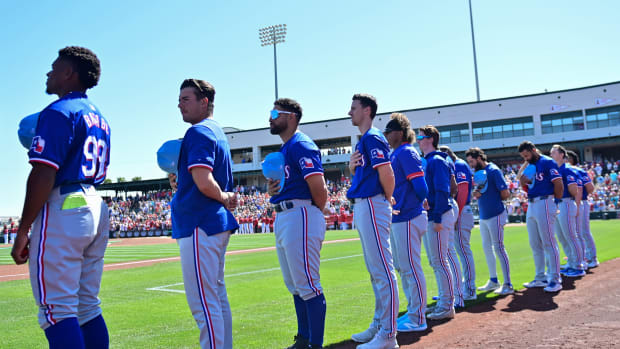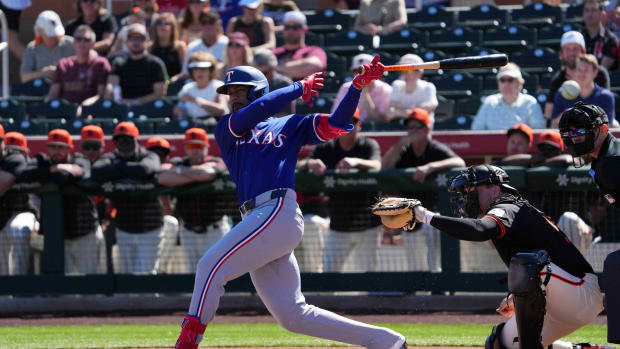MLB's 'Reality TV' Playoff Change is a Flaccid Attempt to Stay Relevant
Baseball is steeped in tradition. After all, it is America's pastime. Generations upon generations of fans have all fallen in love with this game in a variety of ways. There's a reason why baseball romantics like myself exist. We've fallen in love with the game at its purest form. Box scores and advanced stats are great and all, but there's nothing like going to a ball game and watching anyone from larger-than-life superstars like Mike Trout or Joe Nobody being the hero that day. It's one of the many reasons why baseball is beautiful.
Major League Baseball has been forced to make changes over the years. From its inception in 1903, the World Series was played between the teams that owned the best record from each league. As baseball expanded and more teams were thrown into the mix, causing each league to spilt into two divisions, the League Championship Series was instituted in 1969. After more expansion, the leagues realigned again to three divisions in 1994, instituting the Division Series.
Do you notice a pattern here? Baseball's expansion was the catalyst for change to MLB's postseason play. No tricks, no gimmicks – all while still boasting the most difficult postseason to reach in American professional sports. More than half of the teams in the NBA and NHL make it to their league's postseason, while the NFL is slightly more difficult, where 12 of the 32 teams earn a playoff berth.
From 1995 to 2012, only eight of the 28 teams (then 30 teams starting in 1998) made it to the postseason. The baseball playoffs boasted the best teams that truly earned a spot to fight for a chance to get to the Fall Classic. After all, the playoffs should be the best of the best, right?
The only downfall to this system is there would be some teams that had playoff-worthy seasons, but would just miss out because of the elite bar MLB's postseason required. Some fans deemed it too elite. This eventually led former commissioner Bud Selig to allow two more teams to make it to the postseason, resulting in not one, but two wildcard teams along with the three division winners from each league. Those two wildcard teams would subsequently face each other in a one-game playoff, and then the postseason format would commence as it had since 1995.
This was met with some pushback, but overall, it hasn't been damaging to the game. The wildcard games have actually brought us some great moments in its short history. And with only 10 of the 30 teams in Major League Baseball qualifying for the playoffs, it still gives baseball fans the best of the best in October.
Now Major League Baseball wants to change again – and this time in not such a subtle way. According to the report by the New York Post, the new contemplated idea would allow seven teams from each league to qualify for the postseason, with each league's top seed earning a bye while the other six teams played in best-of-three series held at the higher seed's home ballpark. Those top-three remaining seeds would get to choose – yes, CHOOSE – their opponents for the best-of-three first round.
Are you kidding me? First off, choose their opponents? If Major League Baseball is trying to be like the NBA, where all star captains now choose their all star teams, this is the proverbial swing-and-miss. The NBA allows captains to choose the All Star teams, which every major professional league's all star breaks are becoming more and more gimmicky as it is – and that's okay. It's an all star game. It's not supposed to be taken seriously.
Introducing the same concept for postseason play is watering down the integrity of the sport. Not to mention it's an obvious overcompensation for baseball's decreasing popularity and a flaccid and frivolous attempt to compete with the NBA's rising success.
Second off, watering down the once-elite bar required to make the postseason has a number of damning effects. There are already complaints about baseball's regular season being too long. It's understandable for fans on the fringe to be disinterested in tuning in for 162 games. People have lives outside of sports.
However, if six of your seven months of play are regular season, then make the regular season mean something. Deadening the relevance of the regular season is literally asking fans to tune in elsewhere from May through August. April will be filled with the excitement of a new season and then the casual fan would tune back in around September if their team has a shot at the postseason. After all, the widening of the playing field gives a lot of teams that aren't worthy to make it a shot.
In 2015, after the institution of the new wildcard system, the NL Central sent three teams to the postseason. The Cardinals won the division, winning 100 games. The Pirates won 98 games and the Cubs won 97. All three of those teams deserved to make a postseason run, with the Cubs proving their spot with a dominant win over the Pirates in the Wildcard game that year, along with making their way to the NLCS.
The Cardinals owned the National League's best record in 2015. There was a three-win gap between them and the bottom wildcard team. If you were to expand it to how MLB could possibly do it in the future, the 84-win Giants and 83-win Nationals would now be invited to the dance. There would now be a 17-win gap between the best and worst teams.
In what universe is this a better solution? Not only does this notion take away the relevance of the regular season, but it also open the doors for teams that are simply undeserving of a postseason berth, resulting in bad postseason play, especially in the first round.
I understand it's counter-culture to think this way. We live in an era of trivial gimmicks and participation trophies. I just hoped that Major League Baseball would be above that. The teams that win the World Series have been worthy of it. It's hard enough as it is to get there – just ask the Rangers. They went to back-to-back World Series in 2010 and 2011, coming only one strike away from winning twice in 2011. Yet, that championship still eludes them.
The teams that win it all should all feel like they earned it. Most of the teams who have at least made it to the World Series played good baseball for seven months, with the occasional exception (2019 Nationals, 2007 Rockies). Even then, those teams did something historic. A part of their regular season coincided with a World Series run.
Consider this: if a team like the Rangers were to win 85 games under this format and somehow win the World Series, should we expect that team to be on the same level at their 96-win 2011 counterpart? I wouldn't. Sure, it's an accomplishment, but it just means they got hot at the right time. And of all the stereotypical storylines in sports, that one is vastly overrated.
Hopefully the outcry against this terrible idea forces Major League Baseball to reconsider this catastrophe. And if this is some attempt to distract us all from the Astros' cheating scandal, it's not funny.
Follow Inside The Rangers on SI on Twitter: @SITexasRangers
Like Inside The Rangers on SI on Facebook: @SITexasRangers
Follow our Rangers insider Chris Halicke on Twitter: @ChrisHalicke
Click the "follow" button in the top right corner to join the conversation on Inside The Rangers on SI. Access and comment on featured stories and start your own conversations and post external links on our community page.




